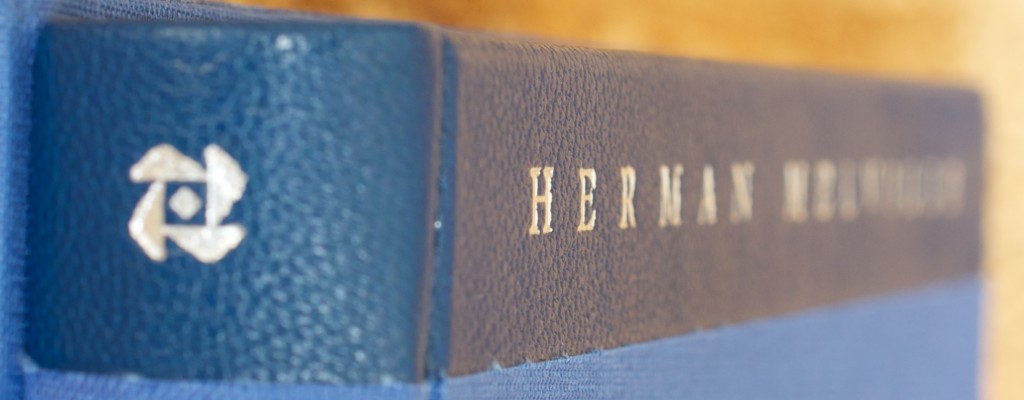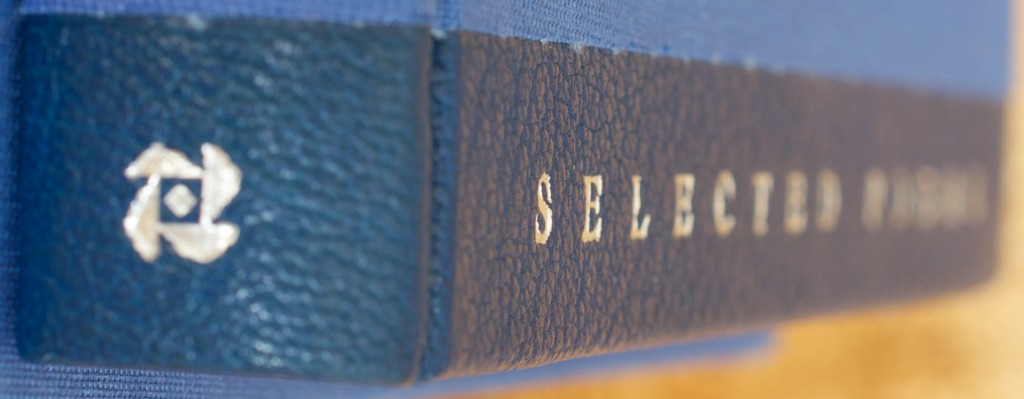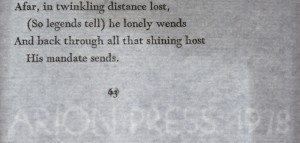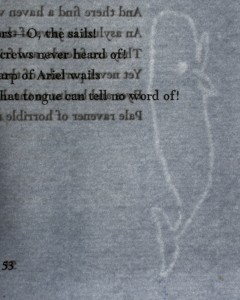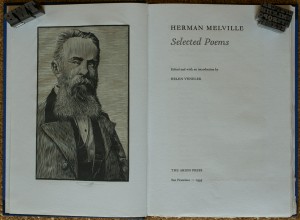 Like many people for whom Moby Dick is the first thing that comes to mind when Herman Melville is mentioned, I’m not sure I was really aware of his poetry. Even after my second reading of Moby Dick, I never really connected Melville to the poem/hymn, commonly referred to as Jonah’s Song, in Chapter 9 of the novel. It was not until I had the pleasure of reading the Arion Press edition of Selected Poems for this review that I comprehended how much of a poet he really was.
Like many people for whom Moby Dick is the first thing that comes to mind when Herman Melville is mentioned, I’m not sure I was really aware of his poetry. Even after my second reading of Moby Dick, I never really connected Melville to the poem/hymn, commonly referred to as Jonah’s Song, in Chapter 9 of the novel. It was not until I had the pleasure of reading the Arion Press edition of Selected Poems for this review that I comprehended how much of a poet he really was.
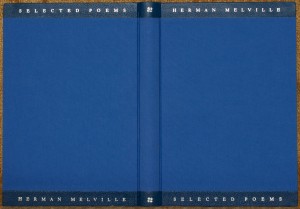 In Helen Vendler’s wonderful introduction, she points out that his poetry hasn’t really ever got its due, or been accepted in the same way as other poets of the time like Whitman and Dickinson. Vendler poses the question:
In Helen Vendler’s wonderful introduction, she points out that his poetry hasn’t really ever got its due, or been accepted in the same way as other poets of the time like Whitman and Dickinson. Vendler poses the question:
Why has he not achieved popularity comparable to theirs [Whitman’s and Dickinson’s]?…it is enough, to explain Melville’s relative lack of popularity, to point out how profoundly Melville’s despairing view of sexuality, war, politics, and religion differs from the Emersonian optimism that American readers have tended to prefer.
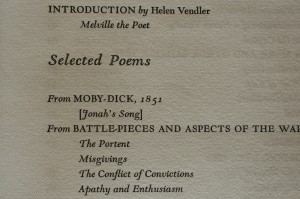 This is a writer whose masterpiece was pretty much ignored and forgotten in his lifetime, driving him into despair and depression. He turned to poetry for most of the rest of his life following the disappointment of Moby Dick’s reception. And his despair and depression and cold, hard view of life comes through in his verse. In addition to his personal tragedies and troubles, the War Between the States also affected him deeply. Vendler points out that
This is a writer whose masterpiece was pretty much ignored and forgotten in his lifetime, driving him into despair and depression. He turned to poetry for most of the rest of his life following the disappointment of Moby Dick’s reception. And his despair and depression and cold, hard view of life comes through in his verse. In addition to his personal tragedies and troubles, the War Between the States also affected him deeply. Vendler points out that
The Civil War arrived as the external equivalent of Melville’s crisis within.
And
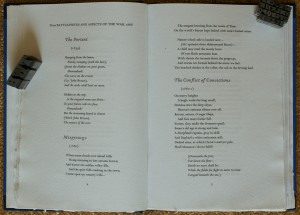 To understand what the carnage of the Civil War meant to Melville—a definitive break with the ethical promise of the United States—one must know something of his life preceding it. He was born into a historical family of New York State: his ancestors had been in America since the seventeenth century, and both of his grandfathers fought in the Revolution. His grandfather on his mother’s side, General Peter Gansevoort, defended Fort Stanwix, and was tendered official thanks by Congress for his actions in the war. For the revolutionary United States to become disunited, for brother to kill brother, for the Constitution to be impugned—this was to Melville a destruction of all that his family had fought for.
To understand what the carnage of the Civil War meant to Melville—a definitive break with the ethical promise of the United States—one must know something of his life preceding it. He was born into a historical family of New York State: his ancestors had been in America since the seventeenth century, and both of his grandfathers fought in the Revolution. His grandfather on his mother’s side, General Peter Gansevoort, defended Fort Stanwix, and was tendered official thanks by Congress for his actions in the war. For the revolutionary United States to become disunited, for brother to kill brother, for the Constitution to be impugned—this was to Melville a destruction of all that his family had fought for.
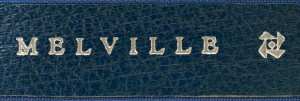 Melville takes a clear look at the carnage and senseless loss of human life that comes with war. He doesn’t glorify war or succumb to jingoism but praises the nobility and courage of those people and actions worthy of praise.
Melville takes a clear look at the carnage and senseless loss of human life that comes with war. He doesn’t glorify war or succumb to jingoism but praises the nobility and courage of those people and actions worthy of praise.
In the wonderful poem, Lee in the Capitol (April 1866), he describes that Southern hero that seemed so wise and noble even in defeat as he faces some Senators who have summoned him to the Capital to question him on the South and maybe gloat a little. Lee tells the Senators that
A voice comes out from these charnel-fields,
A plaintive yet unheeded one:
‘Died all in vain? Both sides undone?’
…
Reap victory’s fruit while sound the core;
What sounder fruit than re-established law?
Eloquently and earnestly he asks them to deal fairly and justly with the vanquished States and heal the still open wounds of the conflict. But to no avail. The poem closes:
But no. Brave though the Soldier, grave his plea—
Catching the light in the future’s skies,
Instinct disowns each darkening prophecy:
Faith in America never dies;
Heaven shall the end ordained fulfill,
We march with Providence cheery still.
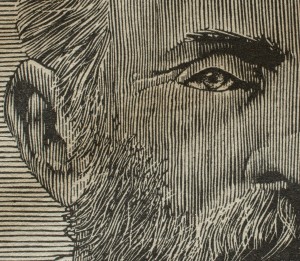 Lee is evoked again as Melville writes against the urge to punish further the defeated Southerners, brothers though they might be, in the poem Rebel Color-Bearers at Shiloh: A plea against the vindictive cry raised by civilians shortly after the surrender at Appomattox:
Lee is evoked again as Melville writes against the urge to punish further the defeated Southerners, brothers though they might be, in the poem Rebel Color-Bearers at Shiloh: A plea against the vindictive cry raised by civilians shortly after the surrender at Appomattox:
Her daring color bearer drop their flags,
And yield. Now shall we fire?
Can poor spite be?
Shall nobleness in victory less aspire
Than in reverse? Spare spleen her ire,
And think how Grant met Lee.
And even though written over 150 years ago about the first battle of Manassas, his words from the poem The March into Virginia still strike me as unlearned lessons for our nation today. I suspect Melville would be horrified by his country’s appetite for constant war. Those same Senators and Presidents never hesitating to send our boys into harms way rings out in the lines
Age finds place in the rear.
All wars are boyish, and are fought by boys,
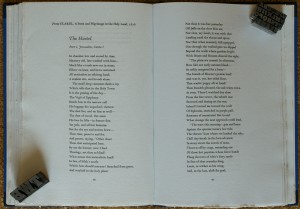 Little did I know when embarking on the reading for this review that I would find a kindred spirit in Melville for my views of war and violence. I will definitely be searching out the whole of Battle-Pieces and Aspects of the War, the book of poetry from which these poems were collected.
Little did I know when embarking on the reading for this review that I would find a kindred spirit in Melville for my views of war and violence. I will definitely be searching out the whole of Battle-Pieces and Aspects of the War, the book of poetry from which these poems were collected.
While the poems on the Civil War really resonated with me, there are also poems from John Marr and Other Sailors, published in 1888, Timoleon (1891), Billy Budd (1924), and Clarel (1876), as well as some other poems uncollected during his lifetime. Favorites for me included the poems Monody, with it’s allusions to Melville’s failed friendship with Hawthorne, The Maldive Shark, Time’s Long Ago, and the mention of my beloved Chesapeake Bay in the excerpt from Clarel: Of the Stranger.
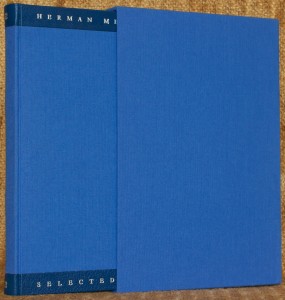 The Arion Press edition is a beautiful book for a myriad of reasons. I’ll never own the magnificent and expensive Arion Press Moby Dick but this “companion” volume is magnificent in it’s own right and will hopefully sit on my shelf next to my University of California Moby Dick that is based on the Arion edition. Selected Poems uses the same paper used for Moby Dick, a special Barcham Green Mill paper with watermarks created expressly for the book(s). I simply can’t get enough of turning the pages and feeling this paper. Barry Moser, who profusely illustrated Moby Dick, contributes an excellent new portrait of Melville for the frontispiece.
The Arion Press edition is a beautiful book for a myriad of reasons. I’ll never own the magnificent and expensive Arion Press Moby Dick but this “companion” volume is magnificent in it’s own right and will hopefully sit on my shelf next to my University of California Moby Dick that is based on the Arion edition. Selected Poems uses the same paper used for Moby Dick, a special Barcham Green Mill paper with watermarks created expressly for the book(s). I simply can’t get enough of turning the pages and feeling this paper. Barry Moser, who profusely illustrated Moby Dick, contributes an excellent new portrait of Melville for the frontispiece.
The binding is one of simple elegance that I would love to see in more of the recent publications of the press. Beautiful blue clothe with darker blue leather headbands and tailbands into which the title and author have been tooled in silver. I’m not sure that is the right binding terminology but can’t find a description of this design in my handy Oxford Companion to the Book, so I’m going with it. The matching slipcase is also wonderful, sturdy and with a matching leather label inset into the spine.
Despite being printed almost 20 years ago, there are still some copies left for sale at the Press, maybe illustrating that aforementioned neglect of Melville the poet. Hopefully, one of those remaining copies will be mine. If you are a fan of Melville and beautiful books, you might want to consider one as well before they disappear!
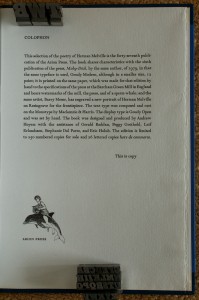 AVAILABILITY: Printed in an edition of 250 back in 1995 (16 years after the publication of their landmark Moby Dick) and still available directly from the Arion Press website. And the book is at the lower end of the Arion Press price spectrum, relatively speaking.
AVAILABILITY: Printed in an edition of 250 back in 1995 (16 years after the publication of their landmark Moby Dick) and still available directly from the Arion Press website. And the book is at the lower end of the Arion Press price spectrum, relatively speaking.
NOTE: The Whole Book Experience would like to thank Andrew Hoyem and the Arion Press for the generosity that made this review possible.

